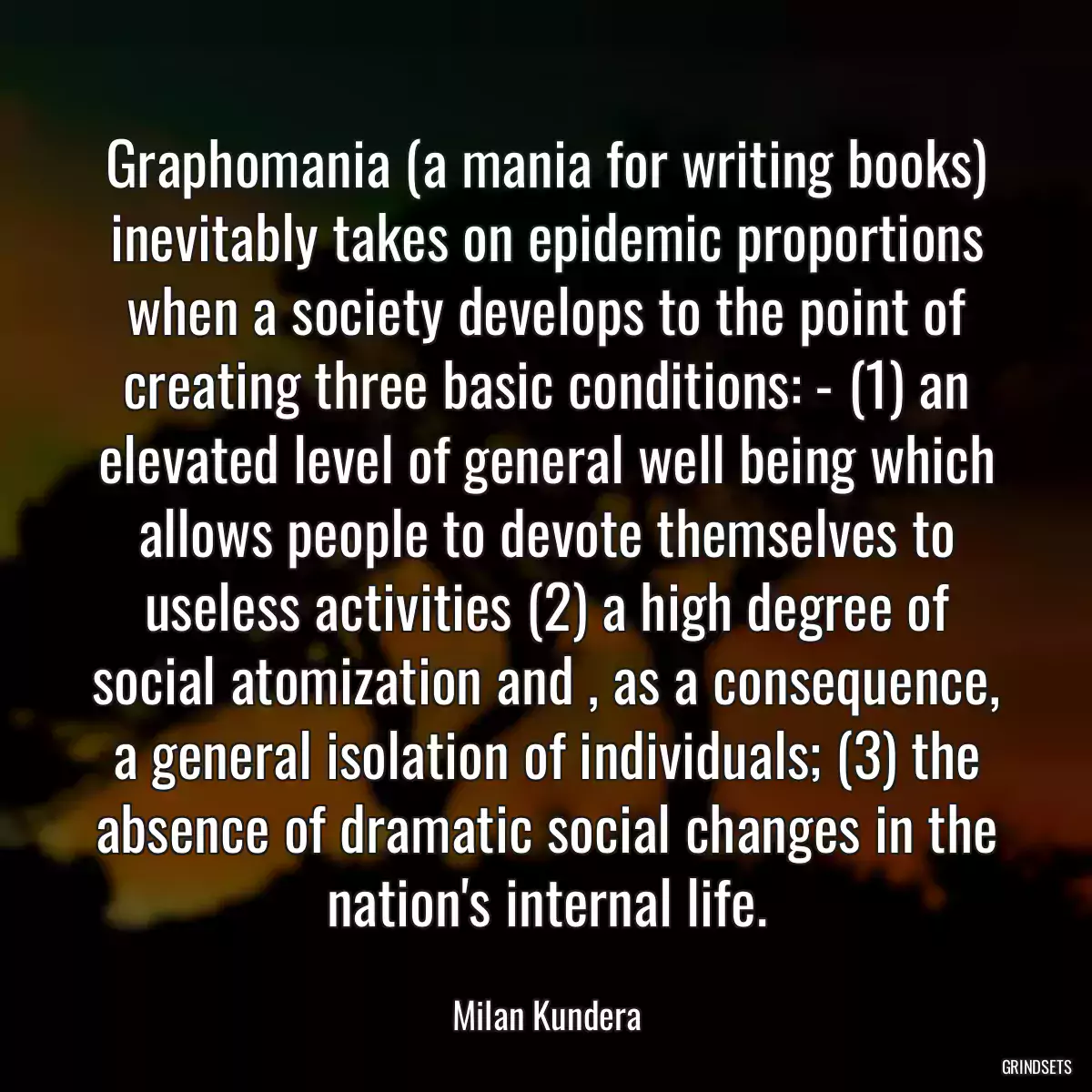
Quotes Milan Kundera
Find dozens of Milan Kundera with images to copy and share.

The day after his father left, Franz and his mother went into town together, and as they left home Franz noticed that her shoes did not match. He was in a quandary: he wanted to point out the mistake, but was afraid he would hurt her. So, during the two hours they spent walking through the city together he kept his eyes focused on her feet. It was then he had his first inkling of what it means to suffer.
She had come to him to escape her mother's world, a world where all bodies were equal. She had come to him to make her body unique, irreplaceble. But he, too had drawn an equal sign between her and the rest of them: he kissed them all alike, stroked them all alike, made no, absolutely no distiction between Tereza's body and the other bodies. He sent her back to the world she tried to escape, sent to march naked with the other naked women
Her kitsch was the image of home, all peace, quiet, and harmony, and ruled by a loving mother and a wise father. It was an image that took shape in her after the death of her parents. The less her life resembled the sweetest of dreams, the more sensitive she was to its magic, and more than once she shed tears when the ungrateful daughter in a sentimental film embraced the neglected father as the windows of the happy family's house shone out into the dying day.
You may also like
Tereza's mother never stopped reminding her that being a mother meant sacrificing everything. Her words had the ring of truth, backed as they were by the experience of a woman who had lost everything because of her child. Tereza would listen and believe that being a mother was the highest value in life and that being a mother was a great sacrifice. If a mother was Sacrifice personified, then a daughter was Guilt, with no possibility of redress.
The worth of a human being lies in the ability to extend oneself, to go outside oneself, to exist in and for other people.
Fortunately women have the miraculous ability to change the meaning of their actions after the event.
While people are fairly young and the musical composition of their lives is still in its opening bars, they can go about writing it together and sharing motifs (the way Tomas and Sabina exchanged the motif of the bowler hat), but if they meet when they are older, like Franz and Sabina, their musical compositions are more or less complete, and every motif, every object, every word means something different to each of them.
This symmetrical composition--the same motif at the beginning and at the end--may seem quite "novelistic" to you, and I am willing to agree, but only on condition that you refrain from reading such notions as "fictive," "fabricated," and "untrue to life" into the word "novelistic." Because human lives are composed in precisely such a fashion.

Living for Sabina meant seeing. Seeing is limited by two borders: strong light, which blinds, and total darkness. Perhaps that was what motivated Sabina's distaste for all extremism. Extremes mean borders beyond which life ends, and a passion for extremism, in art and in politics, is a veiled longing for death.
People fascinated by the idea of progress never suspect that every step forward is also a step on the way to the end.
Such are the Splendors and Miseries of memory: it is proud of its ability to keep truthful track of the logical sequence of past events; but when it comes to how we experienced them at the time, memory feels no obligation to truth.
Only animals were not expelled from Paradise.
A man able to think isn't defeated - even when he is defeated.
To be mortal is the most basic human experience, and yet man has never been able to accept it, grasp it, and behave accordingly. Man doesn't know how to be mortal. And when he dies, he doesn't even know how to be dead.
What is unique about the "I" hides itself exactly in what is unimaginable about a person. All we are able to imagine is what makes everyone like everyone else, what people have in common. The individual "I" is what differs from the common stock, that is, what cannot be guessed at or calculated, what must be unveiled, uncovered, conquered.
Two people in love, alone, isolated from the world, that's very beautiful. But what would they nourish their intimate talk with? However contemptible the world may be, they still need it to be able to talk together.
How could she feel nostalgia when he was right in front of her? How can you suffer from the absence of a person who is present? You can suffer nostalgia in the presence of the beloved if you glimpse a future where the beloved is no more.
You may also like

Graphomania (a mania for writing books) inevitably takes on epidemic proportions when a society develops to the point of creating three basic conditions: - (1) an elevated level of general well being which allows people to devote themselves to useless activities (2) a high degree of social atomization and , as a consequence, a general isolation of individuals; (3) the absence of dramatic social changes in the nation's internal life.
Suspending moral judgment is not the immorality of the novel; it is its morality. The morality that stands against the ineradicable human habit of judging instantly, ceaselessly, and everyone; of judging before, and in the absence of, understanding. From the viewpoint of the novel's wisdom, that fervid readiness to judge is the most detestable stupidity, the most pernicious evil.